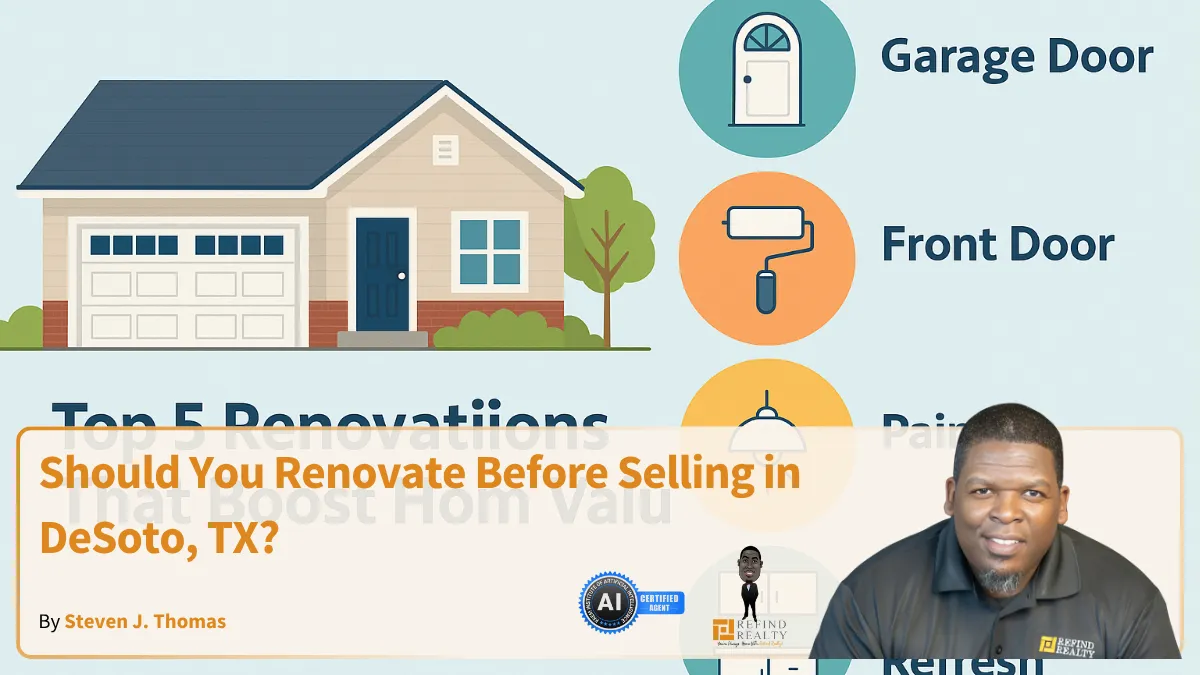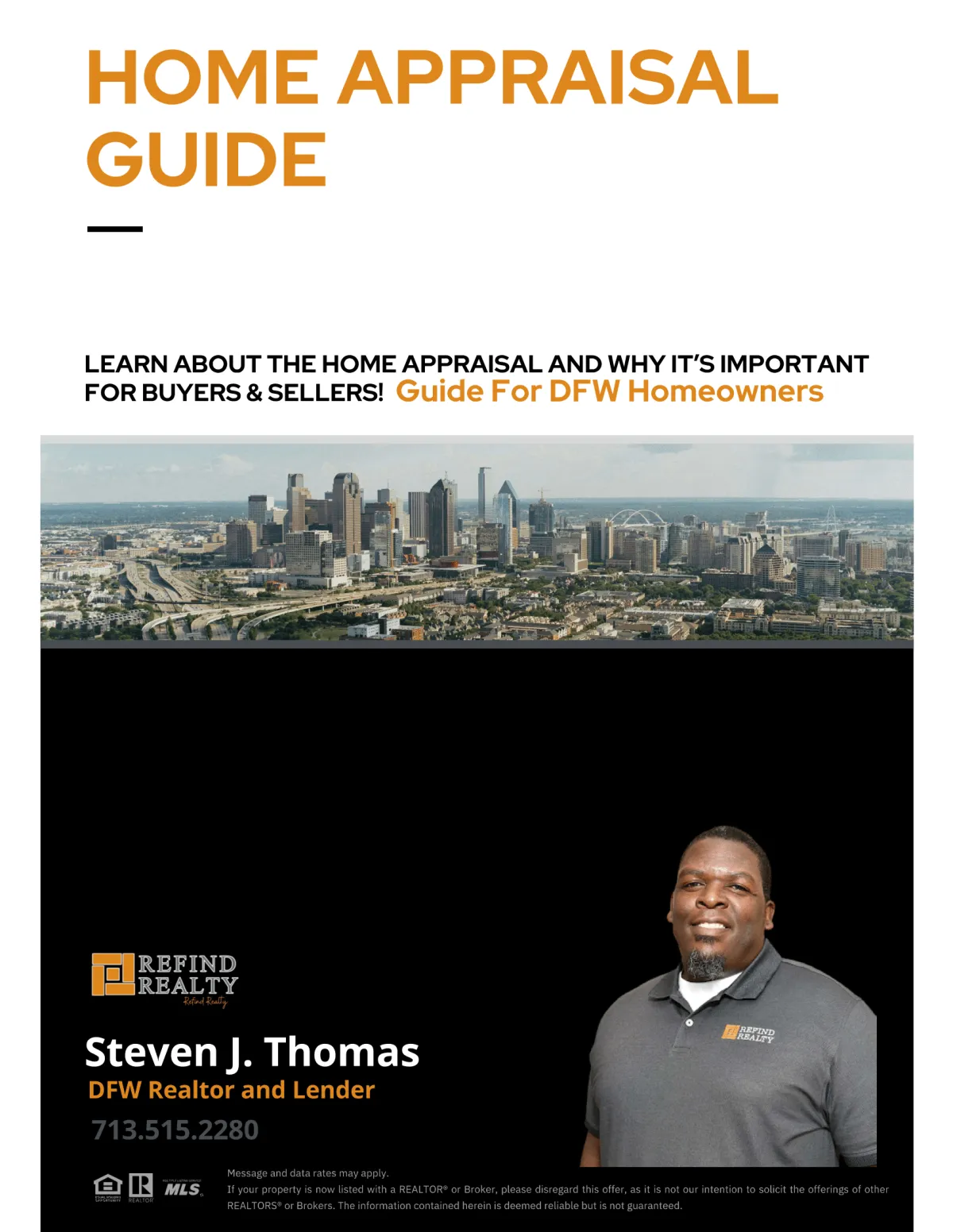You're Always At Home With Refind Realty.
Serving Your DFW Real Estate Needs Since 2005.
We Help You Buy and Sell in The Greater Dallas-Fort Worth Area.
Check Out Our Social Media Channels!
Buying in DFW
Buying your first or next home should be a rewarding and exciting time in your life, and one that you look back on with fond memories.
Thinking Of selling?
The market has changed a lot and I'd love to show you the exact strategy I use to get sellers in DFW top dollar for their property.
Get Pre-Approved
Let me walk you through the entire pre-approval process so you know exactly how much home you can afford.
We Help You Buy and Sell in The Greater Dallas-Fort Worth Area.
Check Out Our Social Media Channels!
Sign Up For my
Email List
My emails are a great way to stay up-to-date with local news and real estate market trends, even if you're not currently in the market. So, come on and join me to stay in the loop!
affordability Calculator
Get pre-approved to know exactly how much house you can afford. Use this calculator to get a quick estimate. Contact me for assistance!
DFW New Construction
Discover the latest new home constructions in DFW and take advantage of the builder incentives that are available now.
Let's Make Your real estate Dreams Come True.
Newest Listings
Call Me Today At (713) 505-2280

Refind Realty Blog:


Should You Renovate Before Selling in DeSoto, TX?
Should You Renovate Before Selling in DeSoto, TX?
By Steven Thomas | Refind Realty

Hi, I’m Steven Thomas with Refind Realty, and I work with home sellers across the Dallas-Fort Worth area every week. One of the most common questions I get is:
“Should I renovate before listing my home in DeSoto?”
The answer depends on your goals, timeline, and current condition of your property. This guide breaks it all down—so you can make a smart, profitable move.
DeSoto’s 2025 Real Estate Market Snapshot
As of mid-2025, DeSoto’s housing market is in a sweet spot for motivated sellers. Median home prices hover around $360,000, and homes are spending fewer days on market compared to early 2024. Still, competition has returned with more inventory, which means presentation matters.
Homes in “move-in ready” condition consistently sell faster and for more money—so even if you’re not renovating, minor upgrades could give you an edge.
Should You Renovate or Sell As-Is?
Here’s the short version:
If your home is well-maintained and mostly updated, focus on cosmetic improvements and maintenance fixes.
If your home is outdated or in poor shape, targeted upgrades may help avoid steep buyer discounts—or worse, a stale listing.
If your goal is speed or simplicity, explore “as-is” selling strategies. Check out my Home Selling Options for more info.
High-ROI Improvements Worth Considering
Not all upgrades are equal. These are the ones that consistently provide the highest return in DeSoto:
Garage door replacement: Up to 194% ROI
New front door: Up to 188% ROI
Stone veneer or siding refresh: ~150% ROI
Interior paint and lighting updates
Minor kitchen refresh: New fixtures, cabinet paint, updated appliances
Need a custom strategy? Grab my free Home Seller Checklist to see what matters most before you list.
Renovations That Rarely Pay Off
Luxury kitchens or baths that exceed neighborhood comps
Full remodels costing $40K+
Pools or complex landscaping features
Smart home upgrades buyers don’t expect in your price range
Use my Home Seller Score Tool to see where your home stands and what buyers will value.
Move-In Ready Matters More Than Ever
Most buyers today want turn-key properties. According to national reports, 77% of buyers say they’ll skip homes that require repairs or visible upgrades. Small details—light fixtures, paint, curb appeal—can make a big difference.
Grab my Home Seller Guide for tips on prepping without overspending.
How to Decide If Renovating Is Right for You
Ask yourself these five questions:
Is my home clean, functional, and up to code?
Are there issues that would show up on an inspection?
Will small updates bring me closer to top-of-market pricing?
How quickly do I need to sell?
What’s my budget for prep?
If you’re unsure where to start, my Home Seller Webinars cover exactly how to evaluate cost vs. value in your area.
Bonus: Should You Renovate If Buying New?
If you're selling in order to buy new construction in DFW, don't over-improve your current home. Instead, focus on fast fixes that help you unlock equity quickly. Use that cash for your next move—and take advantage of my New Construction Rebate Program to save thousands on your new home.
Ready to start shopping? Browse the latest Dallas-Fort Worth New Construction Homes and Get Pre-Approved with a lender I trust.
Final Thoughts: Renovate Only What Matters
Renovating before selling in DeSoto makes sense—but only if you choose wisely. Focus on buyer turn-offs like old paint, bad lighting, or outdated fixtures. Avoid big projects unless your home is significantly under market value.
Need help creating a smart improvement plan? Let’s connect for a free walkthrough and honest advice. You’ll get a personalized, no-pressure game plan designed to help you sell confidently.
Download the Lone Star App here: https://lonestarliving.hsidx.com/@sthomas
You're Always Home With Refind Realty
FAQs
Should I renovate before selling my home in DeSoto, TX?
It depends. Focus on cost-effective updates that boost buyer appeal and avoid over-improving.
What’s the best ROI renovation in DeSoto?
Curb appeal updates like garage doors and front entries deliver some of the highest returns.
Can I sell my home as-is in DeSoto?
Yes, but expect lower offers. Use my Home Selling Options page to explore what fits your needs.
Should I remodel the kitchen before selling?
Only if it's very outdated. Otherwise, consider a refresh—paint, new pulls, and lighting.
Is landscaping worth it?
Yes. Simple front yard cleanup or fresh mulch can significantly boost curb appeal and attract buyers.
How do I know what my home is worth before upgrades?
Use my Home Seller Score tool or contact me directly for a quick CMA.
Stay Informed With My Downloadable
Buyer and Seller guides

6 Smart Ways to Build Home Equity

7 Insider Secrets To Selling Your Home w/o a Lot of Time or Money

DFW Home Seller Negotiation Secrets

Home Appraisals Guide

Avoiding Pitfalls That Can Derail Your Home's Sale

Ultimate Guide To Buying a Home

A First Time Homebuyers Guide In DFW

Are You Ready To Buy?

25 Insider Secrets To Buying A Home

How to Improve Your Credit
Download All My Guides For Free
Unable to find form
(I'll send you all 10)

Refind Realty DFW
50+ 5 Star Reviews
Over $90,000,000 in Total Real Estate Sales
267+ Properties Sold

Wondering What Your DFW Home Could Be Worth in 2024?
Get a Professional Home Valuation From A Local Market Expert
Unlock insights into potential selling prices.
Get a personalized analysis sent directly to your inbox.
Stay ahead with updates on property value fluctuations.
Benchmark your property against neighborhood listings.
Get a FREE Home Valuation And Potential Net Sheet:
Unable to find form


Mr. Thomas real-estate company performed a outstanding job handling my transaction in buying my beautiful new home. I would recommend him to all my family and friends in the future.
{user.name}}


Steven was very knowledgeable about the questions I had and very attentive to my needs and wants of buying a house. His approach was as if he was buying the house for himself. That led me to trust his knowledge and expertise. Thomas for your next purchase of a home. He also worked with me every step of the process and helped me to understand and that made it less stressful In buying a home. I highly recommend Refind Realty and Steven On your first or next purchase. I start 2024 with a new build house with equity going in the door. Thank you Steven
{{user.name}}


Steve did a great job helping during this journey he was very communicative with everything and his response time was very quick every time we had a question. I really recommend him and his office to everyone who want any real state services.
{{user.name}}

Ask Us Anything
Frequently Asked Questions
Why do you need a Realtor?
When buying or selling a home, there are so many options…which can also present a lot of obstacles. Laws change, forms change, and practices change all the time in the real estate industry. Because it’s our job to stay on top of those things, hiring a realtor reduces risk, and can also save you a lot of money in the long run.
When you work with me as your Realtor, you’re getting an expert who knows the area; knows how to skillfully guide your experience as a seller or buyer; can easily spot the difference between a good deal and a great deal. My job is to translate your dream into a real estate reality, and I work hard to earn and keep my business. This also means earning your trust: When you work with me, you’ll be working with a realtor who looks out for your best interests and is invested in your goals.
Which loan should you choose?
There are two different types of loans conventional loans and government-backed loans. The main difference is who insures these loans:
1 - Government-backed loans (FHA, VA and USDA):
(a) - Are, unsurprisingly, backed by the government.
(b) - Include FHA loans, VA loans, and USDA loans.
(c) - Make up less than 40 percent of the home loans generated in the U.S. each year.
2 - Conventional loans
(a) - Are not backed by the government.
(b) - Include conforming and non-conforming loans (such as jumbo loans).
(c) - Make up more than 60 percent of the loans generated in the U.S. each year.
What is the difference between FHA, VA and USDA loans?
1 - FHA LOANS:
FHA loans, which are insured by the Federal Housing Administration, are typically designed to meet the needs of first-time homebuyers with low or moderate incomes. FHA loans can be approved with a down payment of as little as 3.5 percent and a credit score as low as 580.
FHA loans are often called “helper loans,” because they give a leg up to potential borrowers who may not be able to secure one otherwise. For this reason, FHA loans have maximum lending limits, which are determined based on housing values for the county where the for-sale home is located.
Because the agency is taking on more risk by insuring FHA loans, the borrower is expected to pay mortgage insurance both at the time of closing and on a monthly basis, and the property must be owner-occupied.
2 - VA LOANS:
VA loans are backed by the Department of Veterans Affairs and they are guaranteed to qualified veterans and active-duty personnel and their spouses. VA loans can be approved with 100 percent financing, meaning VA borrowers are not required to make a down payment.
Unlike FHA loans, borrowers do not have to pay mortgage insurance on VA loans.
3 - USDA LOANS:
You may also hear about USDA loans, which are backed by the United States Department of Agriculture mortgage program. USDA loans are intended to support homeowners who purchase homes in rural and some suburban areas. USDA loans do not require a down payment and may offer lower interest rates; borrowers may have to pay a small mortgage insurance premium in order to offset the lender’s risk.
What’s a conventional loan? Understanding what it means to be conforming and non-conforming
Buyers who have a more established credit history and a larger down payment may prefer to apply for a conventional loan. These loans may offer a lower interest rate and only require the home buyer to purchase monthly mortgage insurance while the loan-to-value ratio is above a certain percentage, so a conventional loan borrower can typically save money in the long run.
Conventional loans are divided into two types: Conforming loans and non-conforming loans.
1 - CONFORMING LOANS:
Conforming loans are those that meet (or conform to) predetermined standards set by Fannie Mae and Freddie Mac — two government-sponsored institutions that buy and sell mortgages on the secondary market. By selling the loans to "Fannie and Freddie," lenders can free up their capital and return to issue more mortgages than if they had to personally back every loan that they approve.
The main standard for conforming loans is that the amount borrowed must be under a certain amount; in Alaska, a single-family home loan must be under $647,200 in order to be considered conforming.
Properties with more than one unit have higher limits.
2 - NON-CONFORMING (JUMBO) LOANS:
But what happens if a borrower wants to borrow more than the Freddie- and Fannie-approved loan amount? In this case, they would have to apply for a “jumbo loan,” which is the most common type of non-conforming loan.
Because the lender cannot resell the jumbo loan (or any non-conforming loan) to Freddie Mac or Fannie Mae, jumbo loans are considered to be riskier than a conforming loan. To protect against this risk, the bank will typically require a higher down payment; the interest rate on a jumbo loan may also be higher than if the same borrower applied for a conforming loan.
What kind of rate should you choose?
Rate types: Fixed-rate vs. adjustable-rate mortgages.
In addition to the loan type you choose, you’ll also have to determine if you want a fixed-rate mortgage or an adjustable-rate mortgage (ARM). A fixed-rate mortgage has an interest rate that does not change for the life of the loan, so it provides predictable monthly payments of principal and interest.
An adjustable-rate mortgage typically offers an initial introductory period with a low-interest rate. Once this period is over, the interest rate adjusts periodically, based on the market index. The initial interest rate on an ARM can sometimes be locked in for different periods, such as one, three, five, seven, or 10 years. Once the introductory period is over, the interest rate typically readjusts annually.
Office 1229 E. Pleasant Run Ste 224, DeSoto TX 75115
Call :(713) 505-2280
Email: [email protected]
Site: www.stevenjthomas.com


Facebook
Instagram
X
LinkedIn
Youtube
TikTok